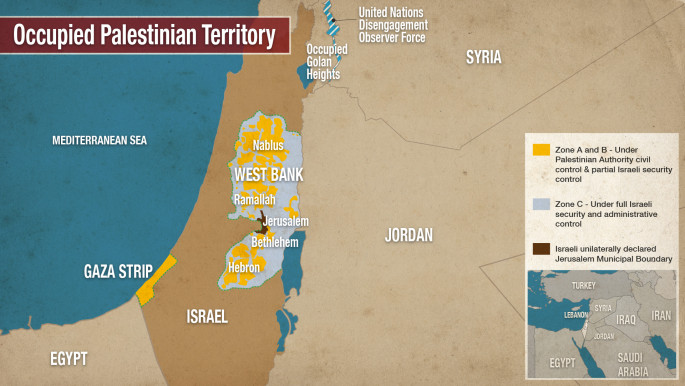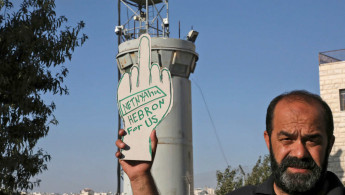Palestinians slam Netanyahu over contentious Hebron visit
Palestinians have expressed outrage after Israeli Prime Minister Benjamin Netanyahu undertook a controversial visit to the flashpoint West Bank city of Hebron Wednesday, to commemorate the anniversary of the 1929 killing of Jews there.
Palestinian President Mahmoud Abbas' spokesperson Nabil Abu Rudeineh slammed Netanyahu for the visit, calling it a dangerous escalation and an attempt to taunt Muslims in the region, Haaretz reported.
"We warn against the dangerous repercussions of Netanyahu's step, which is being carried out in order to win the votes of [Israel's] extreme right wing. The international community ought to act to prevent such aggression," he stated.
The visit by Netanyahu was a rarity and came just ahead of Israel's 17 September elections, with the prime minister seeking to attract votes from the country's nationalist right.
He attended a ceremony marking 90 years since the murders of more than 60 Jews in Hebron in, then located in Mandatory Palestine.
Today around 800 Israeli settlers live under hefty Israeli army security in a city of around 200,000 Palestinians.
"We're not seeking to disinherit anyone, but nobody will disinherit us," Netanyahu said at the ceremony.
|
"We came to Hebron to express our victory," he sad, adding "the people of Israel are deeply entrenched in Hebron".
Election pledge
During the visit, leading Israeli officials called for the annexation of Hebron, a Palestinian city already scarred by illegal occupation that has carved it in two.
Knesset Speaker Yuli Edelstein and Culture Minister Miri Regev made the call for the annexation of the Palestinian city on the 90th anniversary of the Hebron massacre.
While Netanyahu did not directly endorse the statements by fellow Likud members Edelstein and Regev, the premier said: "We're not strangers in Hebron. We'll stay in it forever."
Regev took the opportunity to remind Netanyahu of his election pledge to annex Israeli settlements in the West Bank, which are considered illegal under international law.
"There is no better place to start bringing that pledge into fruition than Hebron," she said.
"If there's no Hebron there's no Tel Aviv. Tel Aviv's right to exist is rooted in Hebron, where Abraham and Sarah are buried."
The area was under heavy guard for the ceremony, with soldiers, explosives experts and sniffer dogs all present.
Stones and firecrackers
The Palestinian Authority condemned his visit - his first since 1998, according to Israeli media - as "provocative" and politically motivated.
"This is a purely colonialist, racist visit that Netanyahu is doing at the height of an election battle in an attempt to win votes from the right and the extreme right," the PA's foreign ministry said in a statement.
Palestinian activists from Youth Against Settlements raised a giant Palestinian flag in the area.
Palestinian youths threw stones and firecrackers at soldiers in the city centre who responded with rubber bullets, witnesses said.
Israeli President Reuven Rivlin was among those attending and called for Israelis and Palestinians to learn to coexist.
"Hebron is not a barrier to peace," he said.
 |
"It is a test of our ability to live together, Jews and Arabs, to live decent lives side by side."
Rivlin also called for the growth of settlements in Hebron and called on the prime minister to authorise the construction of a new "neighbourhood" in the city.
Abraham's mosque
After his address, Rivlin visited the site known to Muslims as the Ibrahimi Mosque and to Jews as the Cave of the Patriarchs - revered by both faiths - where he said a prayer, his office said.
Netanyahu is fighting for reelection in a campaign in which settler votes will be key in his efforts to build a right-wing coalition.
The Israeli occupation of the West Bank is widely seen to have hit Hebron hardest among Palestinian cities.
The joint mosque-synagogue complex that hosts the tomb of Abraham was the site of the brutal massacre of 29 Palestinian worshippers by extremist Israeli settler Baruch Goldstein in 1994.
The massacre prompted Hebron to be excluded from the jurisdiction of the Palestinian Authority as stipulated in the Oslo Accords.
Since 1997, it has instead been divided in two - with around 80 percent of the city governed by the PA and 20 percent occupied by Israel, with a large troop and settler presence.
Israeli settlements are seen as illegal under international law and a major obstacle to peace, as they are built on land the Palestinians see as part of their future state.
Agencies contributed to this report.





 Follow the Middle East's top stories in English at The New Arab on Google News
Follow the Middle East's top stories in English at The New Arab on Google News
![Israeli forces ordered bombed Gaza's Jabalia, ordering residents to leave [Getty]](/sites/default/files/styles/image_330x185/public/2176418030.jpeg?h=a5f2f23a&itok=_YGZaP1z)

